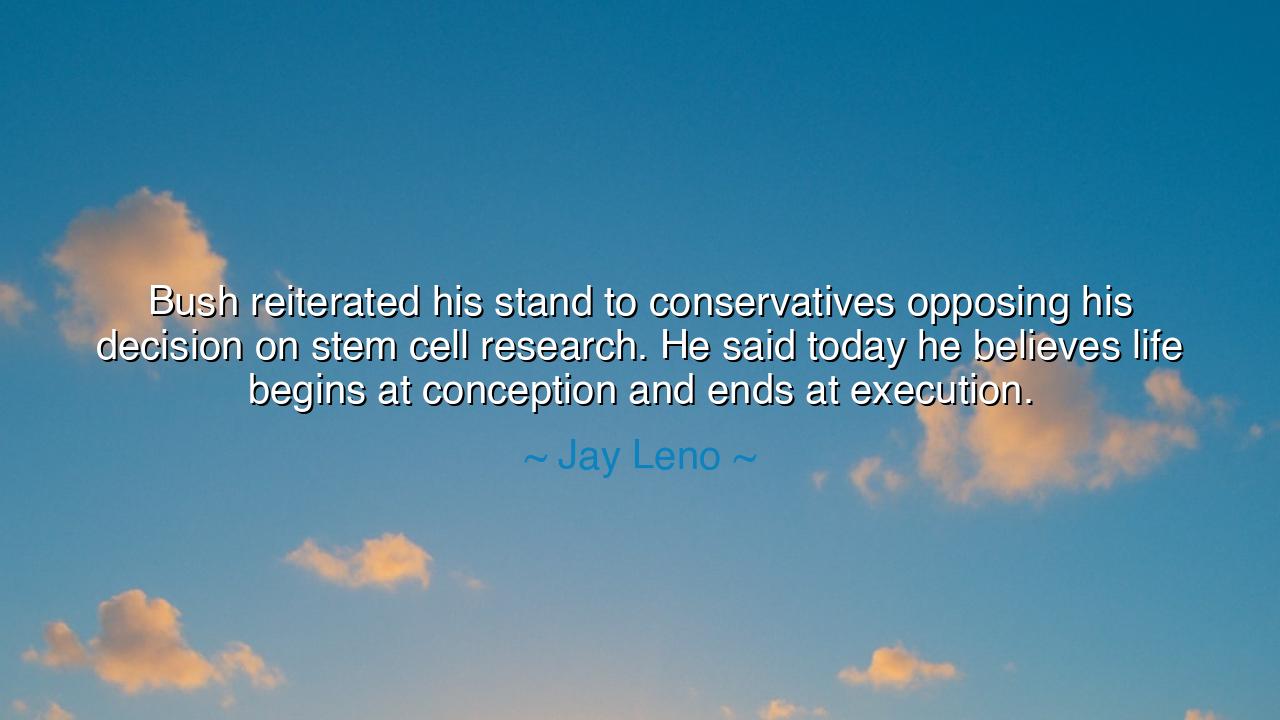
Bush reiterated his stand to conservatives opposing his decision
Bush reiterated his stand to conservatives opposing his decision on stem cell research. He said today he believes life begins at conception and ends at execution.






“Bush reiterated his stand to conservatives opposing his decision on stem cell research. He said today he believes life begins at conception and ends at execution.” Thus spoke Jay Leno, not as a philosopher or statesman, but as a jester whose craft was satire. Yet, as with the fools of old who mocked kings, his jest contains a wound of truth. In his words he reveals the paradox of politics: to uphold life in one moment with solemn conviction, and to end it in another with equal certainty. Humor here is but the veil for a question as old as morality itself—when does life begin, and who has the right to end it?
The origin of this statement rests in the fiery debates of the early 2000s, when President George W. Bush opposed federal funding for certain kinds of stem cell research, declaring that to destroy embryos for science was to destroy human life. Yet at the same time, his policies upheld the death penalty, even defending its use as justice for grievous crimes. Leno, with the sharpness of wit, drew out the contradiction: that the defense of life was applied at conception, but its sanctity abandoned at execution. Thus the quote speaks not only of one man’s policy, but of the broader human tendency to apply principles unevenly when they clash with politics, power, or fear.
History has seen such contradictions before. Consider the ancient Romans, who praised themselves for their laws, justice, and respect for life within their Republic, yet fed slaves and prisoners to beasts for spectacle. Or think of the medieval Church, which condemned the shedding of innocent blood, yet blessed swords for holy war. Men have always struggled to reconcile the purity of their principles with the demands of their societies. Leno’s humor, light as air, rests on the heavy truth that the line between reverence for life and disregard for it is often drawn by convenience, not consistency.
Yet we must not see only hypocrisy; we must also see the human struggle behind it. For to govern is to wrestle with complexity. The defense of life at conception arises from the conviction that every potential soul is sacred. The sanction of death at execution arises from the conviction that justice sometimes demands retribution for the gravest crimes. Each belief has its reasons, its passions, its history. The tragedy is not only that they contradict, but that mankind rarely pauses to acknowledge the tension, to search for a higher wisdom that unites them.
Leno, as satirists often do, holds up a mirror. He forces us to see the absurdity of declaring life sacred in one breath, and expendable in another. His jest is not mere laughter, but a call to reflection. For in that reflection lies the question: what does it mean to honor life? Is it enough to defend it at its fragile beginning, or must it also be defended even when it is broken, sinful, and condemned? These are not easy questions, but they are necessary ones, for without them our principles risk turning to empty slogans.
The ancients knew this danger. The Hebrew prophets cried out against rulers who sacrificed to God yet oppressed the poor. The Stoics taught that virtue lies in consistency, that one’s life must be harmonious with reason, not fractured by contradiction. In every age, the wise have warned that when principle bows too easily to expedience, truth is lost. Leno’s jest is but the modern echo of this ancient wisdom, wrapped in laughter but rooted in justice.
So, O listener, take this lesson: be wary of contradictions within your own heart. Do not defend a principle in one place and abandon it in another without reflection. Whether you speak of life, of justice, or of mercy, seek to live in harmony with the truth you proclaim. In your judgments, in your choices, strive for consistency, for it is there that integrity is born. For though satire may pass quickly as laughter, the questions it raises linger, demanding of us not jest, but courage.






AAdministratorAdministrator
Welcome, honored guests. Please leave a comment, we will respond soon